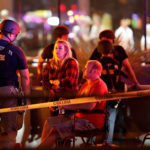 So tragic are the mass shootings that appear to be an ever more frequent occurrence in the United States that one would imagine the response would be united in horror at the atrocities, but a new analysis by Stanford University suggests there is a clear partisan divide in how such events are discussed online.
So tragic are the mass shootings that appear to be an ever more frequent occurrence in the United States that one would imagine the response would be united in horror at the atrocities, but a new analysis by Stanford University suggests there is a clear partisan divide in how such events are discussed online.
The analysis found that Republicans were much more likely to talk about the shooter, whereas Democrats seemed to talk more about the victims. Republicans were also more likely to discuss the specific facts of the event, whereas Democrats veered more towards policy changes they would like to see.
“We live in a very polarized time,” the authors explain. “Understanding what different groups of people say and why is the first step in determining how we can help bring people together. This research can also help us figure out how polarization spreads and how it changes over time.”
Different perspectives
The researchers trawled through over 4.4 million tweets made after 21 distinct mass shooting events over the past few years. They were looking specifically for the words and emotions people from across the political spectrum used in their messages.
The differences outlined above were not the only distinguishing features of tweets from red and blue camps, with Republican tweets much more likely to express fear and disgust, with Democratic tweets more prone to expressing sadness and a call for change. Republicans were also 25% more likely to include ‘terrorist’ in their message if the shooter happened to be an ethnic minority (with Democrats more likely to do so if the shooter was white).
What’s more, the differences continued even when attempting to contextualize the shootings, with Democrats more likely to mention previous shootings, and Republicans more likely to mention previous attacks where the perpetrator was a person of color, with the 9/11 attacks a common point of reference.
Sadly, this polarization in language only becomes more pronounced as time passes after an attack, with an eventual plateau reached after several days.
“Ideological polarization happens very fast,” the researchers say. “As soon as an event like a mass shooting happens, people react very differently right away. This research gives a large-scale insight into how polarization works linguistically.”
Polarized language
There have been numerous studies exploring the polarity in views between liberals and conservatives, but this study is interesting because it dives right into the language people use as well as what they think. The authors believe that their insights can go some way towards fixing the echo chambers that can exist online.
Indeed, it even sheds a fascinating light on the way language can infer biases in and of itself, which could also be useful in better understanding how a topic, and the debates surrounding it, are framed linguistically.
“It’s easy to not reflect on the words you use daily,” the authors conclude. “But I think it’s a good step forward if people are just aware of their own biases.”